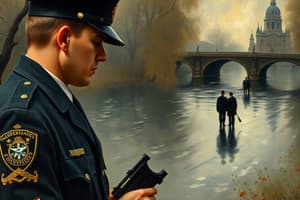Podcast
Questions and Answers
What was the main concern of Professor Peter Kraska and his associates regarding the police?
What was the main concern of Professor Peter Kraska and his associates regarding the police?
- The militarization of U.S. police departments (correct)
- The non-negotiable use of coercion by the police
- The socialization of sworn auxiliary police officers
- The use of force by the SWAT teams
What did the author find to be the most important factor in police work based on his study?
What did the author find to be the most important factor in police work based on his study?
- The militarization of U.S. police departments
- The non-negotiable use of coercion (correct)
- The socialization of sworn auxiliary police officers
- The use of force by the SWAT teams
What did Professor Kraska and his associates believe was 'taking over' U.S. police departments?
What did Professor Kraska and his associates believe was 'taking over' U.S. police departments?
- The non-negotiable use of coercion by the police
- The use of force by the SWAT teams (correct)
- The socialization of sworn auxiliary police officers
- The militarization of U.S. police departments
What was the author's primary criticism of Professor Kraska and his associates' argument?
What was the author's primary criticism of Professor Kraska and his associates' argument?
According to Christopher Cooper, what has American police departments shifted from?
According to Christopher Cooper, what has American police departments shifted from?
What does Radley Balko focus on in relation to SWAT raids?
What does Radley Balko focus on in relation to SWAT raids?
What is criticized by Radley Balko in relation to SWAT teams?
What is criticized by Radley Balko in relation to SWAT teams?
What does the ACLU report conclude about SWAT raids?
What does the ACLU report conclude about SWAT raids?
According to the text, what is the root cause of SWAT team use and mass incarceration of poor blacks and Hispanics?
According to the text, what is the root cause of SWAT team use and mass incarceration of poor blacks and Hispanics?
How did the police in Ferguson, Missouri respond to riots?
How did the police in Ferguson, Missouri respond to riots?
How do the Baltimore riots in 2015 differ from the Ferguson riots?
How do the Baltimore riots in 2015 differ from the Ferguson riots?
What was the outcome of the Laquan McDonald case?
What was the outcome of the Laquan McDonald case?
What led to the death of Eric Garner?
What led to the death of Eric Garner?
What happened to the officers involved in the Tamir Rice incident?
What happened to the officers involved in the Tamir Rice incident?
What is Project Ceasefire?
What is Project Ceasefire?
What is the primary aim of Crisis Intervention Teams (CIT)?
What is the primary aim of Crisis Intervention Teams (CIT)?
How do Scottish police effectively handle most individuals?
How do Scottish police effectively handle most individuals?
What can help avoid European soccer riots according to the text?
What can help avoid European soccer riots according to the text?
How does the discipline of military personnel and firefighters differ from that of the police according to the text?
How does the discipline of military personnel and firefighters differ from that of the police according to the text?
'Police critics, such as Kraska and Balko,' according to the text, do what in their analysis?
'Police critics, such as Kraska and Balko,' according to the text, do what in their analysis?
Flashcards are hidden until you start studying
Study Notes
- The text discusses the perception of militarized police during protests and analyzes three controversial police killings: Lequan McDonald, Tamir Rice, and Eric Garner.
- Laquan McDonald was killed by Officer Jason Van Dyke for no apparent reason, leading to his indictment for murder.
- Tamir Rice, a 12-year-old boy, was shooting a toy gun and was immediately shot by police, with no officers being indicted in the incident.
- Eric Garner was selling cigarettes and died after being put in a chokehold by police, with no officers being indicted for their actions.
- Project Ceasefire is a program where individuals involved in most shootings and homicides are identified and offered a choice between harsh punishment or social services, significantly reducing violent crimes.
- Crisis Intervention Teams (CIT) can reduce violence by employing verbal de-escalation and using restraint.
- Scottish police effectively handle most individuals without the use of force by using verbal de-escalation, distance, and plastic shields.
- European soccer riots can be avoided through "dialogue policing," which involves negotiations with demonstrators.
- The police are often accused of being militarized, but military personnel and firefighters have closer discipline and follow orders to attack enemies or extinguish fires, while police use restraint.
- Police critics, such as Kraska and Balko, selectively focus on sensational cases and ignore the mundane aspects of most police work, which involves preventive patrol, writing traffic tickets, and answering calls for non-violent situations.
Studying That Suits You
Use AI to generate personalized quizzes and flashcards to suit your learning preferences.




